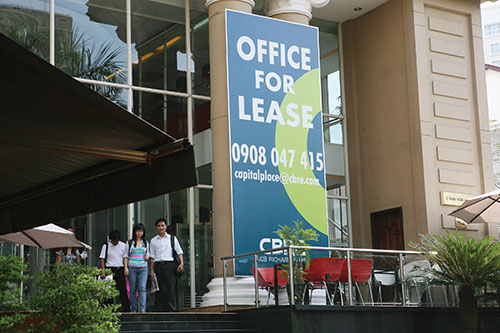Diversification in downturn

Many of Vietnam’s real estate consultancies are diversifying their portfolios in order to survive the sector’s recent downturn
Photo: Le Toan
Troy Griffiths, deputy managing director of Savills Vietnam, told VIR that the company’s traditional business lines, leasing and project sales, had come under duress and led to layoffs in under-performing areas of the business.
“However Savills total headcount has increased to 940 as we have added new business lines and expanded our property management services offering,” he explained.
“We are fortunate that our recurring income streams of property management and advisory services have delivered continuous cash flows, albeit at very low margins. Savills manages 70 buildings throughout Vietnam that delivers steady cash flow over challenging economic periods,” he added.
Griffiths said Savills would continue to diversify their business to cater to broader client needs.
Following its success and achievement in sales of high-end residential products and holiday home, Savills Vietnam has set out a new business strategy to diversify the stocks and to be more adaptive to market demand. Specifically, in late June, Savills Vietnam Real Estate Trading Floor launched this extended new business service for sales and marketing of affordable housing products.
The company has established a strategic partner with one of the local real estate company to exclusively distribute the Dream Home apartments developed by Dream Home Ltd. in Go Vap district, Ho Chi Minh City.
“Importantly the affordable housing sector represents over 70 per cent of the primary market; as such it would simply be bad business to ignore this potential,” said Griffiths.
Savills has recently expanded its consulting capacity with products such as Geographic Information Systems and its agency platform in Indochina and Myanmar.
Along the same line, CBRE Vietnam recently held a conference that focused on identifying more lucrative potential projects in Myanmar.
Marc Townsend, managing director of CBRE Vietnam, said the company had been affected by the real estate market’s downturn over the last few years, forcing its to reduce the working space of its Hanoi office by half.
The company’s property transaction centre in Hanoi has been narrowed and residential sales team has been most affected due to the housing market downturn.
“CBRE is serving fewer customers than before, but that has given us the opportunity to focus more on quality service. While there are fewer foreign investors, there are increasing numbers of local companies who are potential clients in the fields of banking, retail, and property development,” he added.
CBRE’s staff working in project management has increased from 2 last year to 12 at current.
“We are currently helping a large foreign company in Hanoi with more than 2,000 staff move its office. We supported them in leasing the space and fitting it out, as well as provided logistics for the move, on time and on budget,” Townsend said.
CBRE has expanded property management, with the floor area under management now doubling from last year’s figure and expected to double again by the end of this year.
Chris Brown, general manager of Cushman & Wakefield Vietnam said the slumping property market was affecting firms’ operations in several areas.
According to Brown, the company’s most heavily affected team was residential sales which spiked in 2007-2008 but had since been heavily impacted by falling demand nationwide. The company continued to be cautious in this area and was limiting the growth of the team until future conditions make expansion feasible.
“Cushman & Wakefield Vietnam has always been careful to avoid overly rapid expansion preferring to pace our growth strategically. We have seen softening in areas such as residential sales and leasing, but these business lines are inherently cyclic and we expect improvement in the next 12 months,” he said.
“We are using the slowdown as an opportunity to relocate to Vincom Center B this year, and expanding our workspace by more than 100 square metres, with room for future expansion,” he added.
“There are areas of our business which are growing and we now have 10 employees working in office leasing in Ho Chi Minh City. We also have developed a fully dedicated national retail services platform and investment agency services,” he said.
Cushman & Wakefield has this year concluded some of the larger transactions in Ho Chi Minh City such as Abbott Laboratories’ lease renewal at Me Linh Point Tower (2,600sqm), Nestle’s relocation to Empress Tower (3,200sqm), Microsoft’s relocation to President Place (744sqm), and JWT relocation to President Place (510sqm). In Hanoi, some of its larger transaction include the IBM’s renewal at Pacific Place (1,500sqm) and the Prudential’s relocation to Keangnam (1,700sqm).
What the stars mean:
★ Poor ★ ★ Promising ★★★ Good ★★★★ Very good ★★★★★ Exceptional
Latest News
More News
- An Phat 5 Industrial Park targets ESG-driven investors in Hai Phong (January 26, 2026 | 08:30)
- Decree opens incentives for green urban development (January 24, 2026 | 11:18)
- Public investment is reshaping real estate’s role in Vietnam (January 21, 2026 | 10:04)
- Ho Chi Minh City seeks investor to revive Binh Quoi–Thanh Da project (January 19, 2026 | 11:58)
- Sun Group launches construction of Rach Chiec sports complex (January 16, 2026 | 16:17)
- CEO Group breaks ground on first industrial park in Haiphong Free Trade Zone (January 15, 2026 | 15:47)
- BRIGHTPARK Entertainment Complex opens in Ninh Binh (January 12, 2026 | 14:27)
- Ho Chi Minh City's industrial parks top $5.3 billion investment in 2025 (January 06, 2026 | 08:38)
- Why Vietnam must build a global strategy for its construction industry (December 31, 2025 | 18:57)
- Housing operations must be effective (December 29, 2025 | 10:00)
















 Mobile Version
Mobile Version